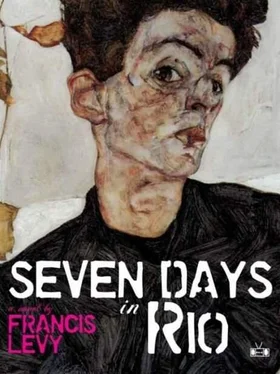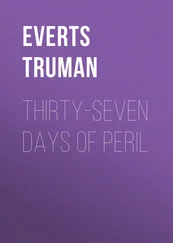The buses coming down into Rio from the mountains are supposed to follow a schedule, but despite very different topography they behaved similarly to the buses on Fifth Avenue, which come in herds and then disappear completely for long stretches of time. I wasn’t sure what bus to take, and I didn’t have the Brazilian equivalent of a MetroCard, but I had the kind of reality that could get me anywhere. Hanging around at Tiffany’s parents’ estate, I was at the top of the economic ladder. Brazil is still a third-world country with a huge population living in shacks and shantytowns, and if 150 reals will buy a 69 from nobility like Tiffany, it wasn’t hard to imagine what the Tiffanys of the peasant class would do for even less. Hitching a ride back to Rio for the same amount seemed like a more than reasonable expectation.
A crowd of leathery peasant women in muslin dresses, their hair wrapped in scarves, suddenly surrounded me. Perhaps it was the bikini underwear. I immediately asked which way to the Copacabana. One of them must have understood me since she pulled out a piece of paper and pencil and started to draw a little map of the Rio shoreline. Unable to decipher her crude map, I immediately asked if any of them had a global positioning device, calling out the letters “GPS” to make my point. They couldn’t figure out what I was talking about and they turned their attentions back to the heavy burlap bags filled with produce they were readying themselves to heft. Soon a bus rounded a sharp curve, bearing down on us at such a high rate of speed that it looked like the centrifugal force was going to cause it to careen off the side of the cliff. But the old hags had their eyes on something else, pointing excitedly toward the gardens at the back of the huge estate, their toothless mouths gaping with screams of delight. Looking up, I glimpsed Tiffany’s father’s infamous gang of naked gardeners, their personal topiaries glistening in the morning dew. Before following my fellow travelers onto the rickety bus, I noticed that its luggage rack was piled high with suitcases and boxes, which looked perilously in danger of either falling off or causing the bus to topple on its side.
As we moved toward the center of the city and then out toward the Copacabana, I noticed that even though it was early morning, the streets were filled with hookers, who I assumed were just coming to the end of the late shift. There was only one time of day when it was really hard to get a hooker in Rio, and that was from mid-morning to early afternoon, when the night shift had already gone home and the girls who worked from 4 p.m. to midnight had yet to punch the clock. It was like in New York, where it’s impossible to get a cab between three and five in the afternoon, when the night men have yet to come on. The only difference was that hookers in Rio didn’t have off-duty signs to turn on like taxis.
To my relief, I wasn’t the only person in the lobby walking around in his underwear. In fact, men clad in boxers, briefs, or old-style Jockey underpants, of the kind my mother used to buy three-for-$5 at Woolworths, outnumbered those dressed in normal street clothes. It was apparent to me that most of the men, tourists like myself, were still in somewhat of a daze, undoubtedly having experienced one of the best nights of their lives. I walked over to the auditorium where the analytic conference was set to convene to check into that day’s presentation.
The lecture of the day was on “Erotomania,” a condition also referred to as De Clerambault’s Syndrome, in which a person has the delusion that they are desired by a well-known figure who doesn’t even know they exist. Before I’d left for Rio, the case of Uma Thurman’s stalker had been in the headlines, and when I’d read the accounts I considered the possibility that the stalker was actually in the right, that Uma was really in love with him but just didn’t know it. Being reminded of this made me question my whole night with Tiffany. Maybe I was just another john to her. Maybe I was investing a tremendous amount of emotional energy in someone who didn’t even fully grasp my existence. Maybe the guilt I felt about breaking away from her was a figment of my imagination.
I also had forebodings about Schmucker and China Dentata. They met so many people — would they even remember me? In addition, I was feeling the stress typical of anyone at a psychoanalytic conference who wants to make time for sightseeing, although in my case the sights were the accoutrements of local streetwalkers. How could I attend the lecture on erotomania, get some sleep, get laid, and also have time to terminate an analysis I had yet to begin? Analyses go on for years, but there is no time limit and no strict rules, especially since the Lacanians had shown that sessions didn’t have to conform to the 50-minute model, and could be as short as one minute in duration. There are 60 minutes in an hour. If I devoted 60 of my remaining 96 hours in Rio to analysis, I could have the equivalent of 3,600 Lacanian sessions, based on the one-minute model. The typical patient, who sees an analyst four days per week for approximately 48 weeks of the year (since most analysts take August off), only does 192 sessions in a year. So by my calculations I would be able to undergo the equivalent of almost 19 years of analysis in roughly four days, simply by shortening my sessions to the absolute minimum allowed by the academy that regulates Lacanian analysis.
With regards to China, there was something more global that I didn’t even want to think about. It related to the compromise of her analytic neutrality. I was starting to veer into a series of thoughts typical of most patients — thoughts that led to the inevitable desire to sleep with one’s analyst. In my case, the fantasy was complicated by the fact that I wanted to sleep with an analyst with whom I hadn’t even begun treatment. I wasn’t sure if the transference with China could be called positive or not.
When I crossed the lobby, I could see China sitting in the breakfast nook of one of the hotel’s restaurants, auspiciously named The New Yorker. I could see the back of the head of the older man she was talking to, and even though I had never studied phrenology, I was sure it was Schmucker. I was seized by a murderous jealousy that almost made it impossible for me to sit down and have a little breakfast of my own. I was afraid to look, afraid that the emotions of seeing Schmucker and China, who I now began to suspect were lovers, would provoke in me an impulse-control problem with grave repercussions. Still, I put one foot in front of the other and headed for a long table covered with bowls of stewed fruits, plates of pastries and croissants, and platters of cheese and cold cuts. Sitting down at a table, my legs shaking with agitation, I was surprised that I had the wherewithal to ask the beautiful, young waitress, who was wearing a nameplate on the breast pocket of her uniform that read “Tiffany,” if I might obtain an omelet to anchor my breakfast. Tiffany was playing with her skirt, and she picked it up enough to reveal the little pink fold that gave away the fact that she wasn’t wearing any underwear. I noticed a banana nestled in her apron pocket in a suggestive way that only Brazilian waitresses knew how to pull off. Even fruits had lost their innocence in this Garden of Eden. She pulled the banana out, rubbing it against her elegant neck and then rolling it across her lips.
“We have some very nice bananas,” she said. “They’re still green, but when you take them back to your room they get ripe.”
I was about to go into analysis, where it’s recommended that patients avoid any major life changes for at least the first year, which according to my calculations meant I shouldn’t start seeing any new Brazilian whores for at least another 3 hours and 12 minutes. Of course, who knew when that would be, seeing that I hadn’t talked to China or Schmucker about starting treatment. But how was I going to explain this to my beautiful bananawielding Tiffany? Clearly, a woman so charmingly unperturbed by the social conventions of underwear could hardly be expected to understand the exigencies of Lacanian analysis. If I told her I was going to have 3,600 one-minute sessions, translating into the equivalent of 19 years of therapy in the remaining 96 hours I was in Rio, she would undoubtedly think I was nuts. Long-term therapy has always been hard to explain in modern times, with our need for quick fixes and painless remedies, and Brazilian society is no exception. I wouldn’t have known where to begin when it came to explaining something like Lacanian analysis, in which a therapeutic interaction that only lasts a minute costs as much as a one-hour session.
Читать дальше












